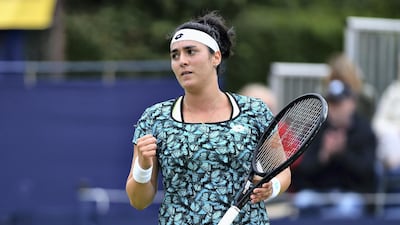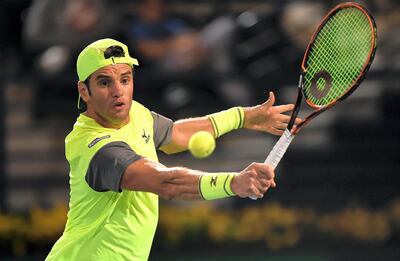Tunisia is not the most obvious country to come to mind when thinking of successful tennis nations.
But the North African nation can claim some success at present as it can boast in Ons Jabeur and Malek Jaziri players who are in the top 60 in their respective rankings.
Jabeur and Jaziri both hit career-high rankings last month, with the former climbing to 56 on the women's WTA charts and the latter rising to 42 on the ATP standings.
They are the only two Arabs in the top 100 and are making history for Tunisian tennis with every new milestone they achieve.
The 24-year-old Jabeur became the first woman from Tunisia, and the Arab world, to reach a WTA final when she blasted through a tough draw in Moscow last October at the Kremlin Cup.
She rose to 60 in the world as a result, making her the highest-ranked Arab woman in tennis history, eclipsing her now-retired compatriot Selima Sfar, who peaked at No 75 back in 2001.
Jabeur is also the first Arab woman to make the third round at a grand slam, reaching that stage at the French Open as a lucky loser in 2017.
She will be hoping to impress in front of an Arab crowd when she competes at next week’s Dubai Duty Free Tennis Championships, just like her compatriot Jaziri did last year, when he made the semi-finals of the men’s event here in the Emirates.
“I never look usually to my ranking, because I hate to do that, but many people tag us on Facebook so you kind of have to look. I was thinking about it and I was like ‘Both of us are at our best ranking’,” a laughing Jabeur explains of her and Jaziri’s upward trajectory.
“It’s really amazing, coming from such a small country, with very small – I’m not going to say opportunities, but we don’t have the facilities like they have in France or Australia or whatever, still we’re doing our best. I’m really proud of our country, I’m really proud of us, me and Malek.”
Jabeur experienced early success when she won the 2011 French Open junior title aged just 16. It was a historic feat that thrust her into the spotlight back home in Tunisia, as the first North African woman to win a grand slam junior trophy.
Jabeur was highly rated from a young age but it was not until the summer of 2017 that she managed to crack the top 100 on the women’s circuit.
She enjoyed a career-best 2018, and now with a strong team around her that includes French coach Bertrand Perret, and her husband Karim Kamoun, who serves as her fitness trainer, Jabeur finally feels like she’s getting to where she belongs, and has the right entourage to guide her there.
“I was waiting for this moment a long time ago. And there is a reason why this didn’t happen straight after the juniors. I was so hard on myself, but I couldn’t do it any other way,” said Jabeur.
Jabeur credits her friendship with Sfar over the last few years as one of the factors that helped her find her way, as well as the time she spent at the Mouratoglou Academy in France.“I didn’t have a good team behind me. No one could tell me what to do because we come from a country where tennis is not really popular, so maybe I was missing someone who can tell me what to do, tell me where to go, and fortunately I was able to do that on my own.
“I was trying to see how players practice on tour, I was trying to be there with the professionals because it was something new for me and new for my country, it was kind of difficult. But I’m happy it came now, at least it came. For many players it didn’t come at all and they gave up before reaching the ranking they want.
“I know I have a huge opportunity to be one of the greatest players and I’m really working on it.”
Jabeur is only 24, but she did spend several years watching her contemporaries pass her by.
Sloane Stephens, who lost to Jabeur at the 2010 junior French Open won the US Open women’s title in 2017. Monica Puig, who Jabeur defeated in the 2011 Roland Garros junior final won Olympic gold at Rio 2016.
Jabeur is focused on her own path though, and believes everything happens for a reason.
“There are a lot of things that happened that shouldn’t have happened but I learned from my mistakes and probably if I didn’t go through those moments, I wouldn’t be here,” she says.
“I was thinking a lot about the ranking, many people were telling me how talented I am – I know I’m talented but talent without work is nothing and talent with so much work is also nothing.
"I was trying to have good balance and everyone tells you to work, work, work but I’m not an animal, I need to rest also. I think sometimes I was working too hard and there was no results and I got annoyed and probably didn’t win any matches, I wasn’t enjoying maybe being on the court.
“Now I learned from also choosing my team, I’m not 16 or 17 anymore. When I was 17 I had coaches who tried to control me, tried to do things that I didn’t like and I couldn’t say no. I was just working until I couldn’t take it anymore and I would explode. I learned to say no and now I’m growing up and I think I can make my own decisions.”
With barely any Arab women competing on the professional tennis circuit, let alone at the top level, Jabeur acknowledges that she is an anomaly, and tries to find an explanation as to why she was able to make it, from this region, while others could not.
“I had a dream since I was young,” she says. “I was hurting also from personal things, I wanted to achieve something and maybe that thing inspired me and got me to believe in my dream.
“I was six years old and I wanted to win the French Open. Everyone laughed. We don’t have that spirit in Tunisia, that you can be a champion. I guess I was good because I wasn’t listening to anyone. I got injured, I had surgery, I could have stopped tennis so many times but I didn’t because I had something in my mind and I had to achieve it.”
Like Jabeur, Jaziri’s journey to the top 50 was far from straightforward, except that he is experiencing the heights of his career at the age of 35.
A self-described late-bloomer, Jaziri also had no road map to follow when he was a young teenager, looking to become a professional tennis player from a country like Tunisia.
He broke into the top 100 for the first time when he was 28 and reached his maiden ATP final last year in Istanbul aged 34.
“My career kicked off very late, but I’m doing everything possible to extend it to the maximum,” Jaziri said.
Jaziri admits that he spent years not working in the right way and that it took him time to figure out the correct path.
Currently coached by Christophe Freyss, who was one of Roger Federer’s childhood coaches, Jaziri is looking to become more consistent in his final years on tour.
He’s on the verge of breaking into the top-40, and is the highest ranked Arab among active players on either tour.
Asked to explain the reasons behind his success, Jaziri says: “Because I have a cool mentality off the court. I just take my bag and go play and each time, I make sure I don’t make the same mistakes made by the person next to me.
“When I was young, I used to view a top 300 player as if he were Roger Federer. Like, ‘Wow, he’s 300 in the world’. Because I didn’t have tournaments in Tunisia, and I never saw that level live with my own eyes, only on TV. I wasn’t exposed to it, so I always thought it was impossible to defeat someone at that level.
"But step by step, I realised I could defeat these players. Then you defeat top 200 players, then top 100, and you keep moving up.”
Last year, Jaziri posted his first three victories against top 10 opposition, upsetting Grigor Dimitrov in Dubai, Marin Cilic in Istanbul and Alexander Zverev in Beijing.
He changed his racquet during the off-season, has worked on his fitness and confessed that he still has a lot of work to do to improve mentally.
Reflecting on his journey so far, Jaziri added: “The process was longer than for others, but the important thing is to get there. I’m not going to dwell on the past, today I am here and I want to improve. There’s no use in thinking about my past mistakes.
“You let go of the past but you don’t forget where you’ve come from and the moments you’ve passed through, because those tough moments give you strength.”



